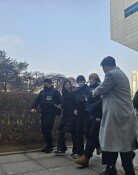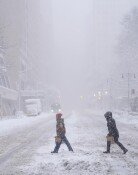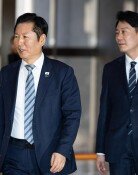A different stance on P`yang voiced at Summit
A different stance on P`yang voiced at Summit
Posted March. 09, 2001 13:27,
During the Korea-U.S. summit in Washington Wednesday, President Kim Dae-Jung and U.S. President George W. Bush reached a broad consensus on inter-Korean issues but voiced differences in their perceptions of North Korea`s intentions. Although the Bush administration has yet to finalize its North Korea policy, such differing viewpoints are likely to mean that policy coordination efforts won`t be easy.
In a joint statement issued at the end of their summit at the White House, President Bush expressed support for the Seoul government`s engagement policy with North Korea and President Kim`s leading role in resolving inter-Korean issues. The statement helped diminish Seoul`s apprehensions over the Bush administration`s stance on North Korea.
However, we are concerned over the U.S. president`s call for transparency and verification with regard to missile and nuclear issues and his overall suspicions of the North Korean regime. Bush went so far as to say that it would be difficult to verify the implementation of a treaty that was concluded with a nation where civil rights and freedom of the press are not guaranteed. Bush`s statement may be interpreted to mean that the U.S. still views North Korea as a ``rogue`` state and that U.S.-North Korea relations are unlikely to improve without eliminating mutual distrust.
More encouraging was Bush`s statement that President Kim ought to maintain a realistic view of the North Koreans by thoroughly verifying the actual implementation of existing inter-Korean agreements. Bush`s remarks were viewed by analysts as a good piece of advice for the Korean government.
It would have been unrealistic to expect that Washington`s North Korea policy, based as it is on a global strategy, would correspond to Seoul`s approach to Pyongyang. Nevertheless, it seems that the Bush administration`s stance is markedly different from that of the Clinton government, especially when we recall that North Korean armed forces chief Jo Myong-Rok visited Washington last October, in the waning days of Clinton`s term of office, as special envoy for North Korean Defense Commission Chairman Kim Jong-Il.
For the Seoul government, now is not the time to boast that the Korean and U.S. presidents have reached an agreement on a grand framework for a joint North Korea policy. Undoubtedly, it will not be easy for Seoul to find ways of advancing the triangular relationship among the U.S. and the two Koreas. The government is urged to demonstrate a more mature diplomatic outlook in this regard.







